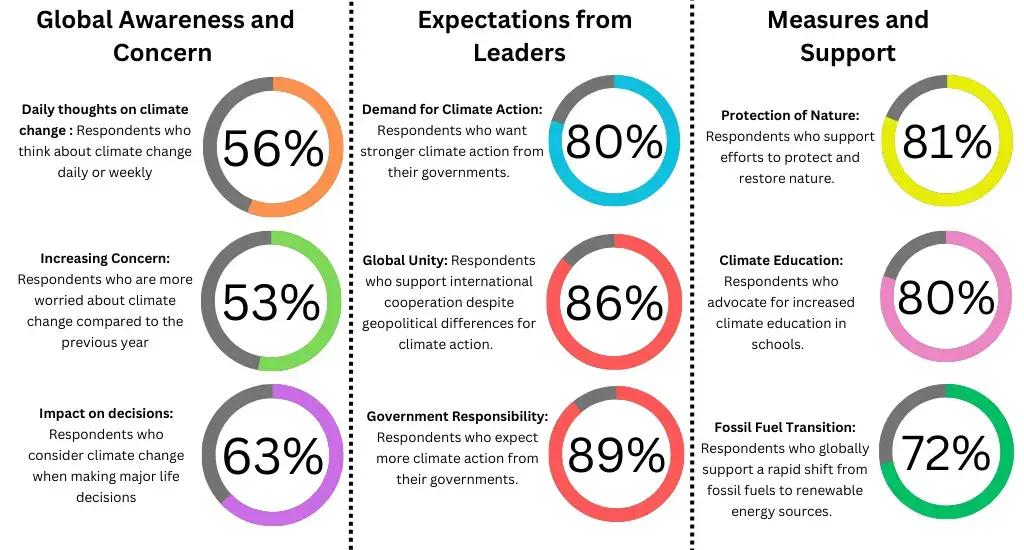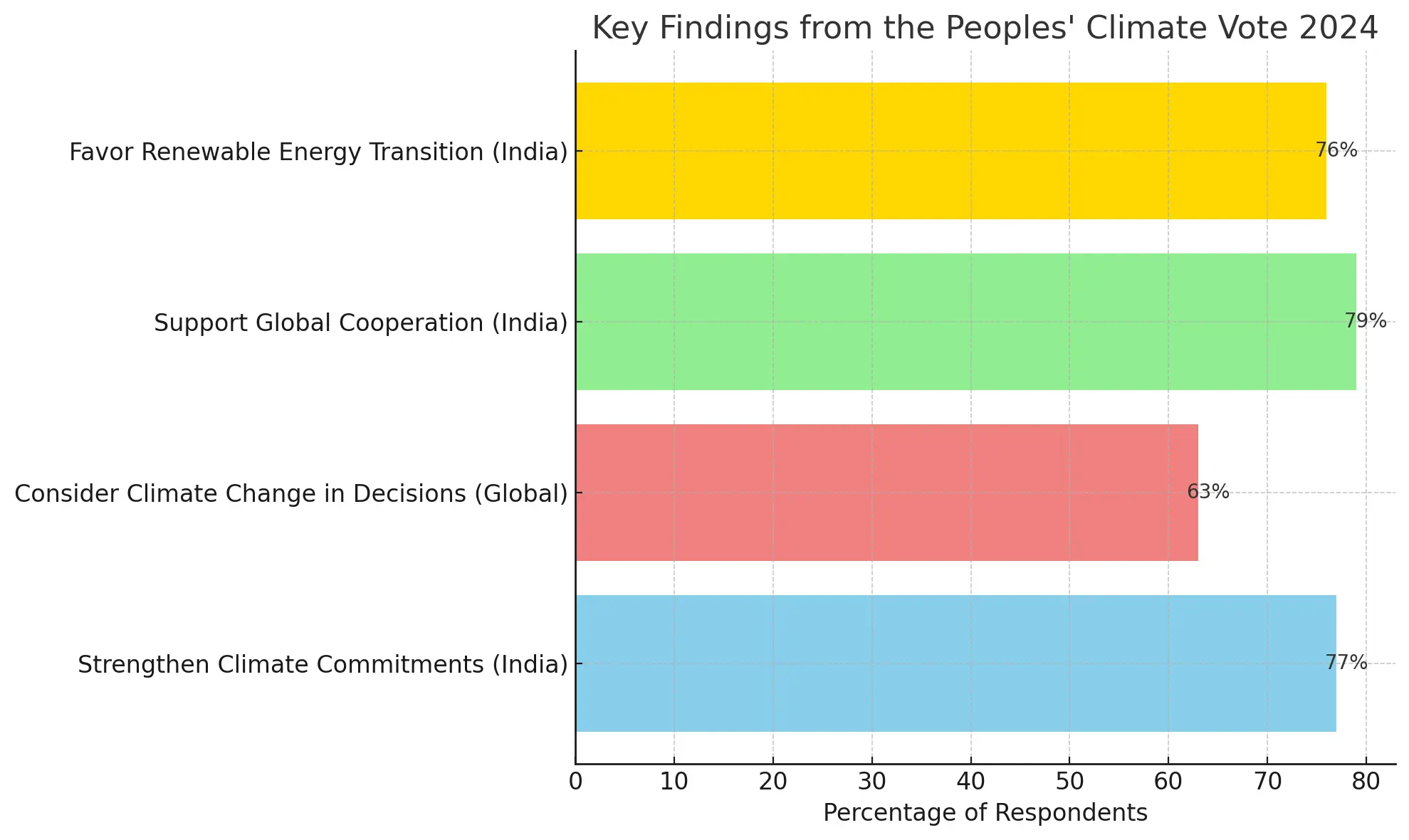July 11 , 2024
Powerful Findings from the Peoples' Climate Vote 2024
The Peoples’ Climate Vote 2024 was
conducted by the United Nations Development
Programme (UNDP) in collaboration with the
University of Oxford and GeoPoll. It
involved over73,000 participants across
77 countries, representing
87% of global population making it the
largest global survey on climate change attitudes and
perceptions.
The survey highlights global perspectives on climate change
impacts, government and corporate responses, and public
expectations.

(Source: UNDP People’s Climate Vote 2024)
According to Cassie Flynn, the Global Director of Climate Change at UNDP, as world leaders prepare for the next round of pledges under the Paris Agreement by 2025, the results demonstrate clear evidence of widespread support for bold climate action.
She noted that the next two years will present a critical opportunity for the international community to ensure that global warming remains below 1.5°C. Flynn emphasized that achieving net zero emissions is essential to this goal. She also highlighted that the UNDP is ready to assist policymakers in enhancing their climate action plans through the Climate Promise initiative.
The countries that are signatories of the Paris Agreement, encompassing nearly all nations worldwide, are expected to submit their third round of Nationally Determined Contributions (NDCs) 9 to 12 months before the United Nations Framework Convention on Climate Change (UNFCCC COP 30) in Brazil next year.
The NDCs (Nationally Determined Contributions) are national climate plans aimed at achieving the goals of the 2015 Paris Agreement, which seeks to limit global warming to below 2°C and preferably to 1.5°C compared to pre-industrial levels (1850-1900). These commitments outline countries' efforts in reducing national emissions and adapting to the impacts of climate change. NDCs are crucial for the collective global effort to mitigate climate change and are periodically updated to reflect increased ambition and progress. By adhering to these commitments, countries aim to contribute to the global objective of limiting temperature rise and ensuring a sustainable future.
Key Findings for India
Awareness and Concern
Daily Thoughts on Climate Change: A significant proportion of the Indian population thinks about climate change on a daily or weekly basis. This reflects a high level of awareness and concern about the issue among the public.
Increasing Concern: More than half of the Indian respondents reported being more worried about climate change compared to the previous year. This increase in concern is likely linked to the increasing visibility and frequency of climate-related events and their impacts on daily life. In India where heatwaves have devastated crop yields and torrential rains have submerged many areas, the Peoples' Climate Vote found that 77% thought their country should strengthen its commitments to address climate change.
Impact on Life Decisions
Big Life Decisions: Climate change is increasingly influencing major life decisions for Indians. This includes considerations such as where to live, work, and what to purchase. The data suggests that 63% of global respondents consider climate change in such decisions, and this trend is equally pronounced in India.
Expectations from Leaders
Stronger Climate Action: A vast majority of Indians desire more robust climate action from their government. This includes stricter policies and measures to mitigate climate change and adapt to its impacts like achieving net zero.
Global Cooperation: There is strong support among Indians for their country to collaborate internationally on climate change, even if it means setting aside other geopolitical differences. A huge majority (79%) of Indians think countries should work together on climate change even if they disagree on other issues, such as trade or security while setting aside geopolitical differences. This highlights the recognition of climate change as a global issue requiring collective action.
Support for Specific Climate Measures
Nature Protection: Indians strongly support initiatives aimed at protecting and restoring nature. This includes measures such as afforestation, wildlife conservation, and the preservation of natural habitats.
Climate Education: There is widespread backing for enhancing climate change education in schools. This reflects the belief that increasing awareness and knowledge among younger generations is crucial for long-term climate action.
Fossil Fuel Transition: A significant majority of Indians support a rapid transition from fossil fuels to renewable energy sources like solar and wind. Three out of four (76%) favor their country replacing coal, oil, and gas with renewable energy such as solar and wind energy.
Climate Justice: Many Indians agree that wealthier nations should provide more support to poorer countries, including India, to help them address and adapt to the impacts of climate change. This includes financial assistance, technology transfer, and capacity-building initiatives.
Public Perception of Climate Efforts
Government Role: Indian respondents view the government as the most impactful actor in addressing climate change. They expect the government to lead in implementing effective climate policies and ensuring their enforcement.
Business Accountability: There is general skepticism about the role of big businesses in tackling climate change. While businesses are recognized as important stakeholders, many Indians feel that their efforts are insufficient and more needs to be done to hold them accountable.

Indians, like people worldwide, are deeply concerned about climate change and expect significant action from their leaders. The insights from this survey can help shape India's climate policies, ensuring they are aligned with public expectations and effectively address the challenges posed by climate change.
The Peoples’ Climate Vote 2024, the largest global survey on climate change, reveals widespread concern and consensus on the urgency of climate action. The results underscore a global call for decisive climate action, emphasizing the need for governments and businesses to align policies and practices with public expectations to address the climate crisis effectively.